#no i do not care if richard's from the 19th century
Text
felt like posting this here as well! made this for a dear mutual of mine
Nathan x Richard my beloveds

#no i do not care if richard's from the 19th century#i love crackships#and old men in love#criminal case#nathan pandit#richard wells#criminal case mysteries of the past#criminal case fanart
129 notes
·
View notes
Text
Vails
I haven't actually talked about it here a lot, partly because I try not to do heavy history stuff here - this blog is meant to be a hobby, after all - and it's something I'm frankly too passionate (obsessed) about, but my main area of historic interest and focus, especially when it comes to my own personal research, is the history of domestic service. It is not an exaggeration to say it is my life's work.
Another reason I don't write about it often is I don't really know where to start. My breadth of knowledge on the subject is quite broad, so there's a lot I could say, but I think I'll try to write some small things about specific aspects of it.
Vails were, in the 18th (and I believe also 19th) century, basically what we could today call tips, often paid to servants. And when you read things written by the 'master class' of people being served, while they're obviously biased and exaggerating, it does become clear that servants rather enforced them. There wasn't a guild system for servants like there were for trades, but there were informal clubs and groups, and this is one of the ways they seem to have acted together, almost as a form of unionization. There's a letter to a British newspaper where the write says that he estimates many servants are doubling, tripling, or even quadrupling their annual salaries through vails. I could write more but I'll just transcribe some of my favourite passages on this subject from the book Life in the Country House in Georgian Ireland by Patricia McCarthy:
I will add too, while this is specifically talking about paid servants in Britain, you do see vails paid to enslaved people in America as well. Probably not as often, but Philip Vickers Fithian, who wrote a diary about his experiences in Virginia in the 1770s, writes about similar things of the enslaved people at the plantation he's staying at expecting their "Christmas boxes" of vails, although they weren't quite as beholden to the actual date of Boxing Day.
...
The customary scene in the hall, as their guests waited for their carriages or horses to be brought to the door, embarrassed many. [Marshall, Domestic Servants] Hosts feigned ignorance of their guests' fumbling in their pockets to find shillings and half-crowns to distribute to the servants, who had lined themselves up expectantly. Whether the motive for allowing the practice was to salve the collective conscience of the employers at paying such low wages is not clear. [Bridget Hill, Servants: English Domestics in the 18thc.] It was not confined to great houses, but was also expected in more modest establishments, although the amounts given were less. It was also not only expected on departure from the house of a friend: vails were disbursed by 'house tourists' to whichever servant showed them around - in most cases an upper servant.
...
An army officer described how much his visit to the house of a friend would cost him: 'The moment your departure is known, all the domestics are on the qui vive; the house-maid hopes you have forgotten nothing in packing up, if so, she will take care of it till you come again; this piece of civility costs you three ten-pennies; the footman carries your portmanteau .. to the hall, three more; the butler wishes you a pleasant journey - his greate kindness in so doing of course extracts a crown-piece; the groom brings your horse, assuring you 'tis an ilegant baste, and has fed well' - three more ten-pennies go; the helper runs after you with the curb-chain, which he has 'till this moment carefull secreted - two more; making a total of seventeen, or, in English money, upwards of fourteen shillings. A heavy tax for visiting a friend!' [Benson Earle Hill, Recollections of an Artillery Officervol. 1]
...
Richard Griffith from Bennetsbridge, Co. Kilkenny, complained in c.1760 in a letter to hise wife that 'an heavy and unprofitable Tax still subsists upon the Hospitality of this Neighbourhood .. in short while this Perquisite continues, a Country Gentleman may be considered but as a generous Kind of Inn-holder, who keeps open House, at his own Expence, for the sole Emolument of his Servants .. this Extravagance is not confined, at present, solely to the Country .. ; for a Dinner in Dublin, and all the Towns in Ireland, is even in a Morning, with a Person who keeps his Port, you may levee him fifty Times, without being admitted by his Swiss Porter. So... I shall consider a great Man as a Monster, who may not be seen, 'till you have fee'd his Keppers.' [R. and E. Griffith, A Series of Genuine Letters Between Henry and Frances, vol. 4]
...
Swift gives similar suggestions in Directions to Servants: 'By these, and like Expedients, you may probably be a better Man by Half a Crown before he leaves the House.' He further urges those servants who expect vails 'always to stand Rank and File when a Stranger is taking his Leave; so that he must of Necessity pass between you; and he must have more Confidence or less Money than usual, if any of you let him escape, and according as he behaves himself, remember to treat him the next Time he comes.'
...
Card money was particularly lucrative for butlers and footmen - so much so that, in London at least, such menservants refused service in houses where gaming parties were not held. [Marshall, Domestic Servants - Two footmen at the court of Queen Anne, Fortnum and Mason, used this perquisite as capital to begin their grocery business in London. Country House Lighting 1660-1890, Temple Newsam Country House Series No. 4] But it was vails that finally undermined the authority of the employers, who virtually allowed servants to dictate whom should be received, and then pretended not to notice when the servants extracted money from the departing guests.
...
In the London Chronicle a correspondent wrote in 1762 that 'Masters in England seldom pay their servants but in lieu of wages suffer them prey upon their guests'. George Mathew of Thomastown, Co. Tipperary, a man famous for his hospitality, was one of the first employers to ban the 'inhospitable custom' of giving vails to servants, and to compensate them by increasing their wages. This was apparently as early as the 1730s. His servants were warned that, if they disobeyed, they would be discharged. He also informed his guests that he would 'consider it as the highest affront if any offer of that sort were made'. [Anthologia Hibernica, I - No date given for this account, by 'Grand George' Mathew, who died in 1737, was the man described, who was host to Jonathan Swift at Thomastown in the 1720s, a visit described by Thomas Sheridan in A Life of the Rev. Dr. Jonathan Swift] A crusade against the giving of vails began in 1760 in Scotland, where seventeen counties issued appeals to abolish them. Four years later the movement had spread to London, resulting in riots there by footmen, the servants who stood to lose the most. [Marshall, Domestic Servants] It was probably at about the same time that employers from a number of counties in Ireland agreed among themselves to abolish vails. [Griffith, Series of Letters..., IV, 'An Agreement entered into among the Gentlemen of several Counties in Ireland, not to give Vails to Servants'] Like George Mathew before them, they decided to increase staff wages in an effort to compensate them for loss of earnings. One of them was Lord Kildare: in March 1765 he issued a directive from Carton to members of his household, stating that 'In Consideration of Vails &c, which I will not permit for the future to be received in any of my Houses upon any Account whatsoever from Company lying there or otherwise I shall give in lieu thereof... five pounds per annum each to the housekeeper, Maitre D'Hotel, cook and confectioner; three pounds per annum each to the steward at Carton, the butler, valet de chambre and groom of the chambers, and two pounds to the Gentleman of Horse.
...
And I will conclude with this funny account, about the penalty for being known amongst the staff to be a spendthrift, from the same book:
...
An unfortunate guest in England in 1754 found his punishment [for not giving vails] truly humiliating. 'I am a marked man,' he wrote, 'if I ask for beer I am presented with a piece of bread. If I am bold enough to call for wine, after a delay which would take its relish away were it good, I receive a mixture of the whole sideboard in a greasy glass. If I hold up my plate nobody sees me; so that I am forced to eat mutton with fish sauce, and pickles with my apple pie.' [Quoted in Marshall, Domestic Servants]
feel free to tip here (and yes the irony of this is not lost on me, although it did not occur to me until about halfway through writing this)
87 notes
·
View notes
Text
"LITTLE WOMEN" (1978) Review
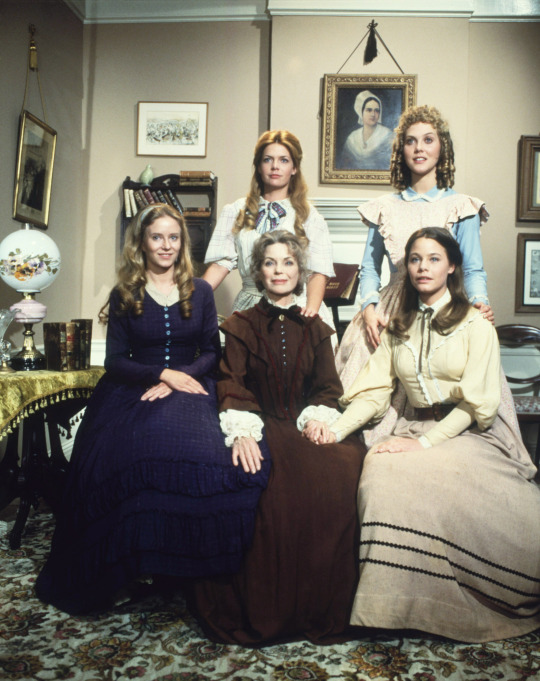
"LITTLE WOMEN" (1978) Review
There have been many adaptations of "Little Women", Louisa May Alcott's 1868 novel. And I have seen most, if not all of the live-action versions. But the first adaptation I have ever seen was NBC's adaptation that first aired back in 1978. If I might be honest, I ended up developing a rather high opinion of it.
Since my first viewing of 1978's "LITTLE WOMEN", I have seen other adaptations. And over the years, I had developed this belief that this television production from 1978 had not been good as I had originally believed. It took many years for me to give this two-part miniseries a second chance. "LITTLE WOMEN" told the story of Josephine (Jo) March and her three sisters during the 1860s - Meg, Beth and Amy. The two-part miniseries opened during the Christmas holidays in December 1861 and follow the sisters, their other family members and friends throughout the Civil War and the early post-war years. Because Jo is the main character, despite being the second sister, this adaptation of "Little Women" has the distinction of being the only version that allows her to serve as narrator.
After my recent re-watch, I could see why my opinion of "LITTLE WOMEN" had diminished over the years . . . at least from a superficial point-of-view. To be blunt, I was not that impressed by the miniseries' production values. The entire production was shot on the Universal Studios backlot and one could sometimes see the California hills in the background. Granted, I still believe set decorator Richard G. Goddard, art director Howard E. Johnson and cinematographer Joseph F. Biroc did the best they could to recreate 1860s Concord, Massachusetts, New York City and Italy. But I did have a problem with the miniseries' costume designs. On the surface, they seemed . . . serviceable for a television production set during the 1860s. But if I must be frank, the costumes also looked as if they had been taken from a costume warehouse for second-rate stage productions. Even worse, all or most of the actresses seemed to be wearing mid-to-late 1970s shoes underneath their mid-19th century dresses and gowns. I was shocked to discover that one of Hollywood's most iconic costume designer, Edith Head, had created the miniseries' costumes. So . . . what on earth happened? Head had created the costumes? "LITTLE WOMEN" was not even Head's first or last period drama. So, what happened?
Did I have any other problems with "LITTLE WOMEN"? Well . . . I did not care for leading actress Susan Dey's hairstyle in the second part of the miniseries. I realize her character, Jo March, had cut her hair to raise funds for her mother's journey to Washington D.C. But her hair never grew back. Never. Instead, it remained shorter than it originally was and styled into a bob. Why? And I had a problem with two particular performances. I will discuss one of them later. The other involved leading lady Susan Dey serving as the miniseries' narrator. Do not get me wrong. Dey is a fine actress and did the best she could. But I found her narration a bit clunky and unnecessary, thanks to the words provided to her by screenwriter Suzanne Clauser's teleplay.
Despite my quibbles, I found a lot to admire about "LITTLE WOMEN". I believe its status as a two-part miniseries, instead of a movie, screenwriter Suzanne Clauser had plenty of opportunities to fully adapt Alcott's novel with less shortcuts and more depth. I have always believed that Alcott's novel was basically a coming-of-age story for Jo March and her three sisters. To me, this made any adaptation of "LITTLE WOMEN" a major character study. And if there is one thing that the two-part miniseries did well was explore its characters and their situations with great depth.
This especially seemed to be the case of Jo's relationship with her neighbor and friend, Theodore "Laurie" Laurence, his personal relationship with his grandfather James Laurence, Amy's European trip and her romantic travails, and Meg's relationship with Laurie's tutor John Brooke. I was especially impressed by the production's handling of Jo's relationship with Professor Friedrich Bhaer. I found it very dynamic, thanks to Suzanne Clauser's screenplay, along with the performances involved. Some, but not all of the adaptations of Alcott's novel tend to forget - at times - that part of it spanned most of the U.S. Civil War. Fortunately, this adaptation never forgot. And as much as I seemed critical of the miniseries' narration, it also reminded television audiences that . . . yes, part of "LITTLE WOMEN" was partially set during the Civil War.
Speaking of performances, "LITTLE WOMEN" had the blessed luck to feature a first-rate cast. I may not have been impressed by the narration provided by Susan Dey (for which I blame another), I was more than impressed by her portrayal of the story's leading character, Josephine "Jo" March. I though she did a superb job in capturing Jo's mercurial personality and obsession with her developing profession as a writer. Meredith Baxter gave an excellent performance as the oldest March sister, Margaret "Meg" March. She conveyed Meg's vanity and obsession with the family's social status and stubborn refusal to give up her love for John Brooke. My only issue is that I believe the actress may have been a bit too old portraying a character that aged from 16 to her early 20s. Eve Plumb portrayed the shy, yet musical Elizabeth "Beth" March. I thought she did an excellent job of combining Beth's emotional, yet retiring nature and in the end, gave a very poignant performance. Ann Dusenberry was roughly 24 to 25 years old when she portrayed the youngest March sibling, Amy. Before my recent re-watch of "LITTLE WOMEN", I had assumed she was too old to portray a younger Amy. But upon my viewing, I realized that she actually managed to give a rather convincing and skillful performance of Amy during the war years (between ages 12 and 16) without to resorting to exaggerated histrionics. And I also admired her portrayal of the older Amy who found herself drawn between two men during her European trip.
I cannot deny that most of the actors who have portrayed Theodore "Laurie"/"Teddy" Laurence over the years gave some pretty damn good performances. But I believe that Richard Gilliland's portrayal of the emotional and moody "Laurie" has to be one of the two best I have ever seen, hands down. His only equal - at least in my eyes - is Jonah Hauer King's performance in the 2017 BBC miniseries. But if I had to choose my favorite portrayal of Laurie's stern, yet warm grandfather, James Laurence, it would be the one given by Hollywood icon Robert Young in this miniseries. May I be frank? I believe both actors provided some of the production's best dramatic moments in their depiction of the developing relationship between grandson and grandfather.
Dorothy McGuire gave a fine performance as Mrs. March aka "Marmie", the four sisters' mother. Thanks to the actress' performance, her Mrs. March seemed more like a well-rounded human being, instead of an archetype. Greer Garson was in fine form as the March family's tart-tongued, yet wealthy matriarch, Aunt Josephine March. William Shatner was excellent as the German-born professor who befriended Jo in New York City, Professor Friedrich Bhaer. Although I found his German accent a bit questionable, I cannot deny that he managed to provide a great deal of energy and complexity to Friedrich's relationship with Jo. Cliff Potts gave a solid performance as Meg's love interest and Laurie's tutor, John Brooke. I can say the same about Virginia Gregg, who portrayed the family's housekeeper, Hannah Mullet. I wish I could provide a better opinion of William Schallert's portrayal of the sisters' father, John March, but his presence in the miniseries seemed very limited, aside from one scene that featured the birth of Meg's children. One performance really failed to impress me and it came from John de Lancie, who portrayed Laurie's English-born classmate from Harvard and Amy's suitor, Frank Vaughan (Fred in the novel). Quite frankly, I found his performance a bit off. Knowing de Lancie for the first-rate actor he truly is, I suspect that between Alcott and screenwriter Suzanne Clauser's writing, the character ended up as a flat, one-note plot device - a situation that not even de Lancie could rise above.
Yes, I had some issues with "LITTLE WOMEN". I found some of the production values questionable, especially some of Edith Head's costumes, the hairstyles and one particular character. But overall, I believe it proved to be a first-rate adaptation of Louisa May Alcott's novel. If I must be frank, thanks to David Lowell Rich's direction, Suzanne Clauser's screenplay and a superb cast led by Susan Dey, I consider the 1978 adaptation of Alcott's novel to be among the three best I have ever seen.
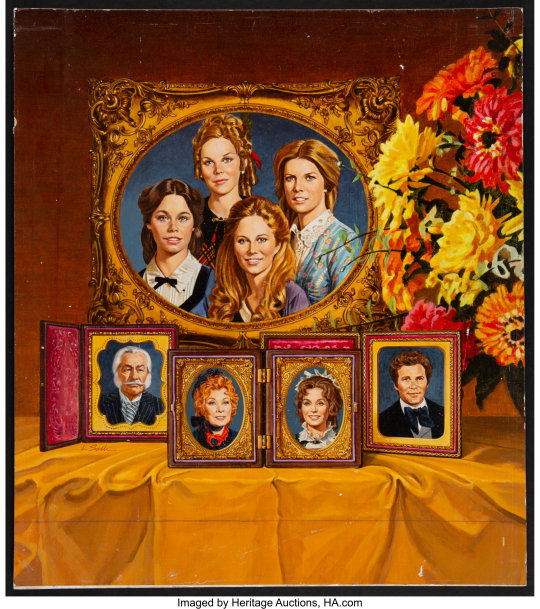
#little women#little women 1978#louisa may alcott#susan dey#jo march#meredith baxter#meg march#eve plumb#beth march#ann dusenberry#amy march#richard gilliland#theodore laurie laurence#dorothy mcguire#marmee march#robert young#greer garson#william shatner#john de lancie#david lowell rich#virginia gregg#cliff potts#u.s. civil war#gilded age#william schallert#joyce bulifant#carlene watkins#period drama#period dramas#costume dramas
13 notes
·
View notes
Note
for the wip game: any that hasn't been asked yet, or if they all have, an idea that has caught your attention that you might explore in the future!
Hello Serie!!! Thank you very much for the ask!!! I'm going to take the chance to share a little bit from the Stony North and South AU.
This fic is a very overdue MTH story for some very lovely friends, and though my progress has been glacial, it IS happening!!! It's a multi-chapter fic inspired by the Elizabeth Gaskell novel North and South, which is set in the north of industrializing England in the 19th century. The original novel is a tale of cultural misunderstandings and class struggle and the mechanical grind of global capitalism and PINING. There's also a BBC adaptation featuring a brooding Richard Armitage and a lot of atmospheric cotton.

For the AU I've played around with the character backstories a bit to try to get more Marvel-esque texture into the mix. Here's a little snip from the opening scene:
.....
Steve had told himself he would adjust to the city, with its narrow streets and ill-swept gutters and thick, coal-heavy fog. But each successive day had seemed to confirm his initial impression that Milton was cold and cramped, and so were its people.
It certainly didn’t help that the only landlord willing to rent to an Irish family on a small income was, well…not particularly attentive.
“I think the room could be improved with some new paper,” his mother suggested as he joined her on the sofa, setting their saucers and cups down on the low walnut table. “Something a little simpler, like the pattern in the sitting room at home.”
They could hardly do worse than what was already there, Steve thought - privately, of course. He really was determined not to load his mother with his troubles as well as her own.
“Here where you receive guests, certainly, you should have whatever paper you please,” he told her.
“Speaking of guests,” she said, inclining her head in a way that let Steve know he should brace for the continuation, “Dr. Banner is going to call this afternoon to see how we’re settling in. And he’s bringing one of his friends, a Mr. Stark, who owns the paper mill, and who can offer us an introduction to some of the families in town.”
“Mother,” Steve started, and he then stopped himself, swallowing yet another word about "notions" with a scalding sip of his tea.
They’d had this conversation many times since the possibility of emigration had been raised. But Steve had kept his own back-alley encounters with the extent of English prejudices too careful a secret to introduce them as evidence now. And though he knew Bucky’s name had to be at the forefront of both their minds, he never could bring himself to reopen the wound by invoking it out loud.
It was unreasonable, after all, to expect his mother to forego society entirely in their new home.
“Of course, any friend of Dr. Banner’s is welcome here,” Steve finished, after what he hoped hadn’t been too obvious a delay.
His mother smiled at him.
“You’re a good son, Steve,” she said. “And a good man, too, though Lord knows you’ve got a stubborn streak wider than a ballybetagh.”
“And who do you think put that there?” Steve asked, a real smile stretching across his face as he took in his mother’s posture: firm and tall after all the past month’s griefs.
Yes, he thought to himself firmly. For her sake he could put aside his wariness of this dim city, with its dense air and shuttered windows. He could be friendly to this Mr. Stark for one afternoon.
.....
Thank you very much for the ask, my dear!!! It was fun to finally share some of this. <3<3<3
#mcu#stony#north and south au#my wips#wip meme#there are no words for how sorry i am about the delay with this fic#but it DOES exist#it's happening
5 notes
·
View notes
Text
Choices Review: Desire and Decorum
Continuing on with my Choices book reviews, I've decided to do Desire and Decorum. I'll say this to get it out of the way: I wish it was GOC! For a long time, I reasoned that if our genderlocked main character could be a person of color and STILL climb the social ladder in Regency era England. But then I realized that if our MC was GOC, Duke Richards could be female, and a young man wouldn't be forced to marry an older woman since the odds of her bearing (healthy) children would be very low. But they could've reworked it!!!
That said, I'm not a historian, so I don't know what's realistic here and what's not; this is just my opinion. What I DO know is that 19th-century England settings are so overplayed; I'd much rather prefer Tudor, Elizabethan, or Jacobean-era English stories.

Book 1 follows a young woman who finds out that her father is a wealthy Earl after her mother passes. However, while he receives her well enough, his wife sees you as a threat to her power and her son's inheritance. I was disappointed by the fact that the story starts off with MC losing her mom, and the towards the end of the story, he passes. While necessary for the story, it feels unfortunate that you have to relive the pain. I'd rather MC's mother had already passed before the book began and she found a letter from her that explained her birth. Along with this, it feels very odd being given the option to pair up MC's best friend with her stepbrother who acts very cruel on his mother's behalf.
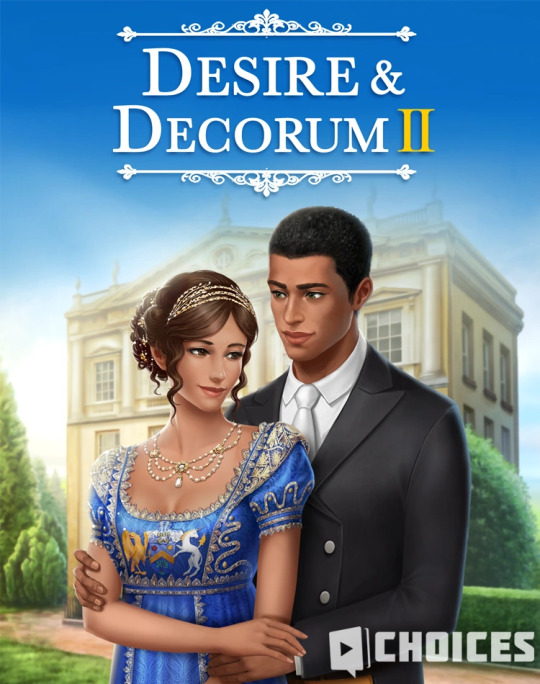
Book 2 has you becoming the inheritor to your father's estate, having overthrown your stepmother but keeping a good report with your stepbrother (or not; depends on the path you choose). However, your grandmother is steering you towards marrying a duke who simply vies for power. And with no one (besides you and your friends) knowing his true intentions, the queen of England gives her permission for you to marry him. It frustrates me that Duke Richards is who MC's grandmother pushes her towards despite stating that Mr. Sinclair is one of the most eligible bachelors and as one of the wealthiest landowners. Granted, he doesn't offer as much rank as Richards, but it's weird that MC's grandmother can't be persuaded to let her marry him (even if you aren't romancing him).
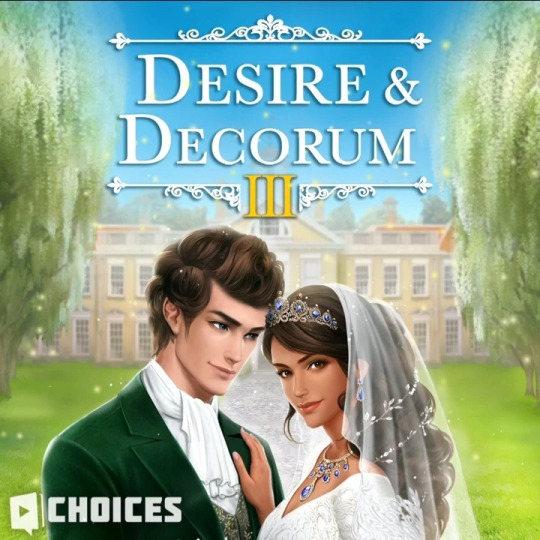
Book 3 covers the wedding of MC to their LI (unless they're romancing the only female option, in which case she marries a secretly gay man who promises to keep her secret and won't hold her to any marital obligations). But of course, that'd be too easy. Your half-brother (who you thought was dead) is actually alive, and your stepmother poisons him against you--making him a difficult character to appease, especially since he is close to the antagonist of this book's story, who hopes to throw a coup against the queen while overthrowing you as well. The story is strong and interesting-but your brother's role in the situation is repetitive, and the fact that this was released at the same time as two other wedding books (AME 3 and TRR 3) didn't help. Had the writers had the foresight to know what they'd do for book 3, I'd want them to nix the stepmother/stepbrother antagonists in book 1 to avoid it being repetitive. Instead, your stepmother could appear amiable and kind until she reveals her true colors now that her other son (and the one with the strongest claim to the estate) is revealed to be alive. Or perhaps we do a tragic story; she's kind and caring, but when her younger son is revealed to be alive, her relief turns to jealousy and anger towards you for "taking" his birthright from him--and maybe for her husband cheating on her and you being the result (I don't recall if he did or if they weren't married at this time). Of course, even then she'd still be the secondary antagonist. Another route I could've seen for this book (and the series in general) addressing British colonialism in India and Prince Hamid could've been an Indian prince instead of an Ottoman prince, as well as MC's friend being mistreated as a maid as a result of her Indian heritage. But this is just me spitballing; like I said, I'm not a historian.
Overall, it was good, but the time period and genderlocked nature of the series makes me lose interest upon replaying it.
#choices#playchoices#desire and decorum#play choices#pixelberry#pixelberry studios#choices stories we play#choices stories you play#choices app#choices game
11 notes
·
View notes
Text
The Sherwood Tour: Character Creation

Found out this morning that Sherwood has sold 72 copies over the three weeks it's been live on DTRPG and Itch. With physical copies arriving at Spear Witch this week, I figured this would be a good day for a Sherwood tour while also admiring Eric Swanson's work on these chapter headers. Today, we'll focus on character creation.
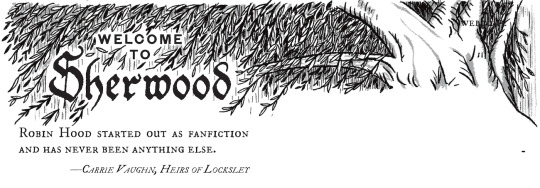
As I was winding down work on Enoch's Wake, I wanted to get a chance to reconsider and rethink how that attempt to do my own version of the core rules of Traveller. It seemed a good fit for my love of the Robin Hood legend, which I'd revisited during the 2020 and 2021 lockdowns. As omicron threw the world back into partial lockdown, it gave me an excuse to immerse myself in movies, novels, Middle English balladry, medieval and Victorian romances, and even a few scholarly works.
Sherwood keeps the lightweight Traveller-inspired 2d6 mechanics I'd used for EW, but adjusts the four attributes and works with them in new ways. Before we start with character creation, though, lets look at the principles:
Be an outlaw! Even if a sheriff never declared your character a wolf’s head, you do not need to worry about what a typical medieval villager or aristocrat would do or think. The forest is too grand a place to for polite society’s petty anxieties about sexuality, gender, and propriety. Make your character whomever you want them to be.
Fight for something! Struggle for justice, scheme for revenge, plot for personal gain. Set some goals for your outlaw and your band that are bigger, wilder, and more wonderful than your character’s former, respectable world allowed.
Dabble with magic! While the traditional Robin Hood ballads do not foreground the magical and mysterious, plenty of Robin Hood novels, movies, and television shows have, and many other medieval outlaws stories included curses, prophecies, spellcraft, fey spirits, and even dragons.
Ditch the ethnic conflicts! The Saxon-Norman conflict was tacked on to the Robin Hood legend and outlaw tradition in the 19th century.
Fuck the true king! Waiting for King Richard to return was a very late addition to the Robin Hood legend. In the original ballads, kings were occasionally useful tools if the outlaws could get their help against officials and aristocrats.
Embrace diversity! While bigots who know little of history will complain, avoid confining yourselves to the biased and discredited accounts of historians from well over a century ago. Go into the forest and find the range of people living free of white supremacy, religious bigotry, and cis-gender heterosexuality.
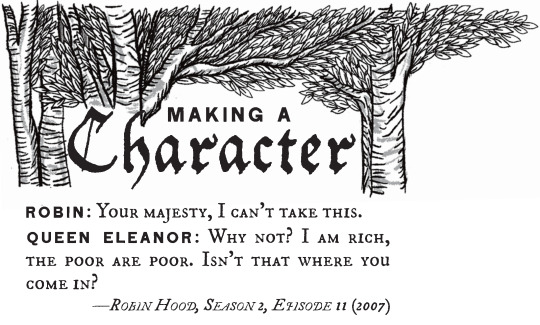
People laugh about dying in character creation now, but Traveller was the first time we saw character creation as a stand-alone mini-game with push-your-luck mechanics. If you died, you could try to make the same decisions again but weren't likely to get the same outcome. In EW, I'd toyed with an option I borrowed from several versions of Cepheus, a family of Traveller retroclones and near clones: if things went badly, you were thrown out of your chosen job.
In Sherwood, though, all lifepaths and careers you can choose from are heading to the same place: outlaw life in the Greenwood. The push-your-luck element here is how long you could stay in the wide world before scandal, misdemeanors, or being officially declared an outlaw (and thus having no legal existence).
Attributes
Like EW, Sherwood uses four attributes: Endurance, Luck, Willpower, and Wits. Like Traveller, they can take damage and like Traveller's psi attribute, can be spent down for various effects, but they aren't used to directly modify most rolls. (And be careful how you spend them: while Skill Checks are 2d6 aiming at the magic target 8, Saving Throws are 2d6 equal or under an attribute's current value.) They're rolled 2d6 straight down, though you also roll one wildcard. You can replace any attribute with the wildcard number (if you want to) and then swap any two attribute scores.
Background Abilities
As in EW, everyone gets two Background Abilities. They can increase your ability scores, give you a small collection of starting skills, designate your character an aristocrat, or give you access to sorcery and arcane talents.
Careers
Like Traveller, Enoch's Wake, Cepheus, and similar games, your character has a career. Sherwood gives you five choices that will ultimately lead to the woods:
Hermits might be Christians or just living in the hermitages for seclusion and study (until the hermitages were disbanded and integrated into traditional religious communities). If you didn't take arcane talents as Background Abilities, this is your one chance to learn them. Inspired by Friar Tuck, anyone can become a Hermit.
Traders require a quick test to join, and then decide whether they did their mercantile travels on land or sea (and if they made any secret studies while traveling). Inspired by the traders and merchants who work with the outlaws in the Hannah Weinstein-produced, CPUSA-funded, and Richard Greene-lead Adventures of Robin Hood TV series.
Performer, a background I keep coming back to for fantasy or medieval games, learn a bit from their time traveling, a bit from their time playing in inns across the land, and a bit from studying old stories. Obviously inspired by various versions of Alan-A-Dale, but also by some versions of Little John that had him living as a festival wrestling performer before joining Robin.
Laborer is a background anyone can take as long as they aren't aristocrats. They learn their skills from their farm and/or town trades as well as by spending their evenings in roadside taverns and inns. Inspired by Robin's peasant, yeoman, and commoner followers in numerous sources.
Cavaliers is a background anyone can try to get into (though those born as aristocrats are never refused). Inspired by the later ballads and novels in which Robin Hood and many of his followers were aristocrats, field sports, jousting, and time in various courts provide most of their skills.
There's two other backgrounds that always start as condemned outlaws who eventually join Robin's bands. The Young Outlaw starts the game as an 18 year old with few skills (a simple character creation option) and the Notorious Criminal who chooses their skills based on the criminal profession they once pursued. These were inspired by the ITV Robin of Sherwood versions of Much the Miller's Son and Will Scarlet as well as the versions of both characters in Jennifer Roberson's Marian novels, as well as other Medieval ballads such as Adam Bell.
Finally, once the career is fleshed out, there's
Equipment and the Band
While everyone has some personal equipment (like a weapon), most other items are held in common. Rather than keep an extensive inventory of what members of the band are carrying on an adventure, characters predetermine their encumbrance or load and roll against their group's two shared stats: Resources (to determine what they have) and Legend (to determine who they know and who'd want to help them). The clever group can figure out how to get what they want or need with either.
Next up: Rules and Arcana (coming sometime before Pax U next weekend).
10 notes
·
View notes
Text
The Secret Wife
The mad wife entered the public consciousness as the "madwoman in the attic" but, if you want to get technical, it was not the attic she was locked up in, it was a room on the third floor. However, it doesn't matter a hoot. It was a confined space and she was kept under a lock. Thornfield could have been a castle and she could have been locked up in a tower, and it would have amounted to the same thing. Additionally, a noun followed by "in the attic" flows so well and makes for punchy title. E.g. The (in)famous series Flowers in the Attic, (technically the children were not in the attic either, they lived in a bedroom on the top floor and played in the attic). There's the film Aliens in the Attic. And book titled The Madwoman in the Attic: The Woman Writer and The Nineteenth Century Literary Imagination, a literary criticism by Sandra Gilbert and Susan Gubar, which examines the works of female 19th century writers. Madwoman in the Attic is also a TV Trope. I personally use the expression for anything related to women and madness, or anger, in a patriarchal society. I have a tag for it on my main. In my fanfics, I refer to the attic as well, for no other reason than that it sounds better.
Okay, so... this is the part of the book where I claim unreliable narrator. I did so before, but that was just to explore various options the narrative offers. Now, don't get me wrong, I do trust Jane. She's not someone who lies. She wouldn't be so virtuous if she lied. But it is also true that she is very young and very inexperienced. See item 8 on my list in the Enter Mr Rochester post. She couldn't even learn much from reading books because she's not read many and those she did read were not learned. It's not her fault. When it came to the merry company, I think a lot of the stuff from her could have been just plain misunderstanding. She doesn't know anything about people of society. (For the record, she doesn't describe them all in a negative light, it's just Lady Ingram, Lady Lynn and Blanche she paints as bad, the rest were okay, she even mentions Mrs Eshton and Mrs Dent were nice to her.) Take it with a pinch of salt, or not, it's up to you.
But the secret mad wife is something else.
The door to the hidden room is opened and they step in. Jane gives a quick description of the room--it has no windows, there is a fender with a fire burning in it, a lamp hangs from the ceiling. Grace Poole is cooking something in a saucepan. And then comes her description of Edward Rochester's lawfully wedded wife.
In the deep shade, at the farther end of the room, a figure ran backwards and forwards. What it was, whether beast or human being, one could not, at first sight, tell: it grovelled, seemingly, on all fours; it snatched and growled like some strange wild animal: but it was covered with clothing, and a quantity of dark, grizzled hair, wild as a mane, hid its head and face.
Rochester cheerfully greets Mrs Poole and asks how her charge is today. Grace answers that she's tolerable, and then warns him to take care.
The maniac bellowed: she parted her shaggy locks from her visage, and gazed wildly at her visitors. I recognised well that purple face,—those bloated features.
Why Jane changes the pronouns from "it" to "she", I don't know. Why she uses the pronoun "it" in the first place, I don't know.
Rochester warns everyone to keep away. He says he supposes his wife has no knife now. Grace responds that:
“One never knows what she has, sir: she is so cunning: it is not in mortal discretion to fathom her craft.”
Richard Mason suggests they'd better leave her. Rochester snaps at him:
“Go to the devil!”
Why? Why should Richard go to the devil? He made a perfectly reasonable suggestion, for everyone's safety.
Bertha springs at Rochester and they fight. Jane in her description of the fight lets the reader know that Rochester could have struck her with one blow but didn't.
Speaking of Rochester striking people. Earlier, in the church, according to Jane, Rochester raised his arm to strike Richard. He didn't, because Richard shrank away. Then, a moment later, as he's trying to defend himself, Rochester says this:
"Cheer up, Dick!—never fear me!—I’d almost as soon strike a woman as you."
But he did attempt to strike him, at least that's what Jane's narration says. So either Jane is not telling the truth, or Rochester is denying an action he carried out only a minute or two ago. An action witnessed by a solicitor and a clergyman. Plus a third man, a clerk, who was also present. So yeah.
Grace hands Rochester a cord, with which he ties his wife's hands and then ties her to a chair. This he does among Bertha's yells and plunges.
Would you believe it. She won't be tied quietly!
Rochester is in his element. He turns to his audience and declares:
“That is my wife,” said he. “Such is the sole conjugal embrace I am ever to know—such are the endearments which are to solace my leisure hours! And this is what I wished to have” (laying his hand on my shoulder): “this young girl, who stands so grave and quiet at the mouth of hell, looking collectedly at the gambols of a demon, I wanted her just as a change after that fierce ragout. Wood and Briggs, look at the difference! Compare these clear eyes with the red balls yonder—this face with that mask—this form with that bulk; then judge me, priest of the gospel and man of the law, and remember with what judgment ye judge ye shall be judged! Off with you now. I must shut up my prize.”
(Wo)Man of the law:

Priest of the gospel:

(Wrong denomination, but it's all I could find.)
And remember with what judgment ye judge ye shall be judged.
Fuck off, Edward.
May I remind you that this is the same guy who appointed himself an authority to judge a woman for wanting to marry a man with money.
There are people who are full of shit. And then there's Edward Rochester.
#jane eyre#edward rochester#bertha antoinette mason#madwoman in the attic#grace poole#mr wood#mr briggs#richard mason#rochester is a villain#jane eyre meta#bertha mason
5 notes
·
View notes
Text
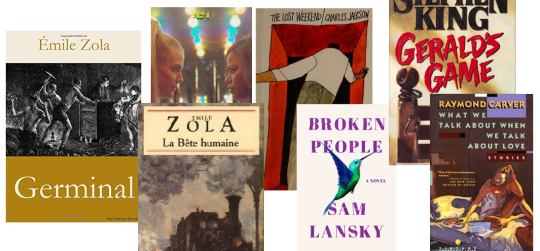
hello join me in thinking about some books and authors that are, or might be, part of s5′s intertextuality
5.10 in particular offered specific shout outs, and also u know i’m always wondering what might be ahead so i have some ideas on that:
- first, as mentioned in a previous ask post, i know i wasn’t alone in keeping an eye out for 5.10 parallels to the lost weekend (1945) the film that gave episode 1.10 its name and several themes - or to the 1944 book by charles r jackson which the film is based on
- s5 has not been shy about revisiting earlier seasons, especially s1. altho i feel that 1.10′s parallels to the lost weekend centered characters other than jughead (mostly betty), a 1.10-5.10 connection involving jughead and themes from jackson’s story (addiction, writers block, self reflection) seemed v possible if not inevitable
- but like,, , for a hot minute after the ep, i was really stumped on understanding how anything from the book or film could apply, even tho the pieces were almost all there
- jackson’s protagonist don birnam goes thru and comes out the other side of a harrowing days-long drinking binge that could be compared to jughead’s one-night hallucinogenic writing retreat
- but jughead is struggling primarily with traumatic memories, not addiction and self control like birnam. and tho drinking activates birnam’s creativity, it paralyzes his writing as he gets lost in fantasies; he’s never published anything. jughead’s drug trip recreates circumstances that already helped him write one successful book. even the rat that startles him mid-high doesn’t line up with birnam’s withdrawal vision of a dying mouse, symbolic of his horror at his own self-destruction thru alcohol
- and maybe the most visible discordance: in the film there’s a romantic motif around a typewriter. first it’s an object of shame; birnam’s failure to write, tied up with his drinking, makes him flee his relationship. he tries to pawn the typewriter for booze money and finally a gun when shooting himself feels easier than getting sober. but with the help of relentless encouragement from girlfriend helen, he quits drinking, commits to her, and focuses on typing out the story he’s dreamt of writing. rd goes so far to avoid setting any comparable scenario that jughead has brought a wholeass printer into the bunker so there can still be a physical manuscript to cover in blood by the end, even without his own typewriter. the subtle detail of his laptop bg image is a little less noticeable than his avoidance of betty’s gift
- tabitha might be closer to a parallel than jughead is, but she’s still no helen. both refuse to take advantage of the inebriated men in their care, but birnam takes advantage of helen, financially and emotionally. jughead refused a loan from the tate family and now has resolved to deal with his shit before he considers a relationship with tabitha. instead of helen’s relentless and unwelcomed attempts to get birnam sober, tabitha reluctantly agrees to help jughead trip safely bondage escape notwithstanding. she even helps him get the drugs.
- whatever potentials exist for parallels to jackson’s story, they were not explored for this episode. ok so why tf am i even talking about this? what was there instead?
- i have arrived at the point
- s5 has been revisiting s1, not directly but with a twist. and jughead’s agent samm pansky is back. u may recall, pansky is named for sam lansky
- jughead’s trip-thru-trauma is a story device tapped straight from lansky’s book ‘broken people’
- lansky is like if a millenial john rechy wrote extremely LA-flavored meta but just about himself no jk very like a modern successor to charles r jackson. both play with the boundary between memoir and fiction. lansky is gay; jackson wrote his lost weekend counterpart as closeted and remained closeted himself until only a few years before his death. both write with emotional clarity and self-scrutiny on the experiences of addiction, sobriety, and the surrounding issues of shame and self worth
- i feel like a fool bc after this ep i had been thinking about de quincey and his early writings on addiction (c.1800s), but i failed to carry the thought in the other direction, to contemporary writers in the genre, to make this connection sooner
- lansky’s second book, broken people, follows narrator ‘sam’, mid-20s, super depressed, hastled by his agent to write a decent follow-up to his first book, but too busy struggling with his self-worth and baggage from several past relationships. desperate, he takes up an offer to visit a new age shaman who promises to fix everything wrong with him in a matter of days. not to over simplify it but he literally spends a weekend doing psychedelics and hallucinating about his exes. jughead took note
- unless u want me to hurl myself into yet another dissertation about queer jughead, i think his parallel to sam - who, unlike jughead, has considerable financial privilege and whose anxieties center on body dysmorphia, hiv scares, and his own self-centeredness - pretty much ends there
- But,, the gist of the book could not be more harmonius with a major theme shared by the 2 films that inform the actual hallucination part of jughead’s bunker scene: mentally reframing past relationships to get closure + confronting trauma head-on in order to move forward
- so that’s neat. what other book and author stuff was in 5.10?
- stephen king and raymond carver get name dropped. i’m passingly familiar with them both but u bet i just skimmed their wiki bios in case anything relevant jumped out
- like jughead, carver was a student (later a lecturer) at the iowa writers workshop. also the son of an alcoholic and one himself
- i recall carver’s ‘what we talk about when we talk about love’ is what jughead was reading in 2.14 ‘the hills have eyes’ after he finds out about the first time betty kissed archie (at that time he does not respond as would any of carver’s characters)
- this collection of carver stories deals especially with infidelity, failings of communication, and the complexities and destructiveness of love. to unashamedly quote the resource that is course hero, ‘carver renders love as an experience that is inherently violent bc it produces psychic and emotional wounds.’ very fun to wonder about the significance of this collection within the s2 episode and in jughead’s thoughts. and maybe now in the context of the s5 state of relationships. or, at least, the state of jughead’s writing as seen by his agent
- anyway pansky doesn’t want carver, he wants stephen king
- i have too much to say about gerald’s game in 5.10, that’s getting its own post someday soon
- lol wait king’s wife is named tabitha uhhh king’s wiki reminded me of his childhood experience that possibly inspired his short story ‘the body’ (+1986 movie ‘stand by me’) when he ‘apparently witnessed one of his friends being struck and killed by a train tho he has no memory of the event’
- no mention of that in this rd episode but memories of a train could be interesting to consider with the imagery that intrudes on jughead’s hallucination. i still feel like it was a truck but the lights and sounds he experiences may be a train
- ok now we’re in the speculation part of today’s segment
- if jughead’s traumatic memory involves trains, then it’s possible this plot will take influence from la bête humaine <- this 1938 movie is based on the 1890 novel by french writer émile zola. this story deals with alcoholism and possessive jealousy in relationships, sometimes leading to murder. huh, kind of like carver. zola def comes down on the nature side of the nature-vs-nuture bad seed question (tho i should say he approaches this with great or maybe just v french compassion). also i can’t tell if this is me reaching but, something about la bête humaine reminds me of king’s ‘secret window’ which we’ve observed to be at least a style influence on jughead post time jump
- but wow a late-19th century french writer would be a random thing to drop into this season, right? then again zola also wrote about miners, which we’ve learned are an important part of this town’s history + whatever hiram is up to this time. and most notably, zola wrote ‘j’accuse...!’ an open letter in defense of a soldier falsely accused and unlawfully jailed for treason: alfred dreyfus. archie’s recent army trouble comes to mind.
- since the introduction of old man dreyfuss (plausibly Just a nod to close encounters actor richard dreyfuss, but also when is anything in this show Just one thing) i’ve been wondering if these little things could add up to a season-long reference to zola’s writings. but i had doubts and didn’t want to speak on it too soon bc, u know, it’s weird but is it weird enough for riverdale??
- however,,,
- (come on, u knew where i was going with this)
- a24′s film zola just came out. absolutely no relation to the french writer, it’s not based on a book but an insane and explicit twitter thread by aziah ‘zola’ wells about stripping and? human trafficking?? this feels ripe for rd even outside the potentials here for the lonely highway/missing girls plot.
- that would add up to a combination of homage that feels natural to this show
- anyway pls understand i’m just having fun speculating, most of this is based on nothing more concrete than the torturous mental tendril ras has hooked into my skull pls let go ras pls let go
#accompanying image has no meaningful organization it's just there to make me look insane. enjoy#riverdale speculation#filmref#but books#adhd has me like. this is Not the post i've been trying to write for weeks but my brain gave me no choice
20 notes
·
View notes
Text

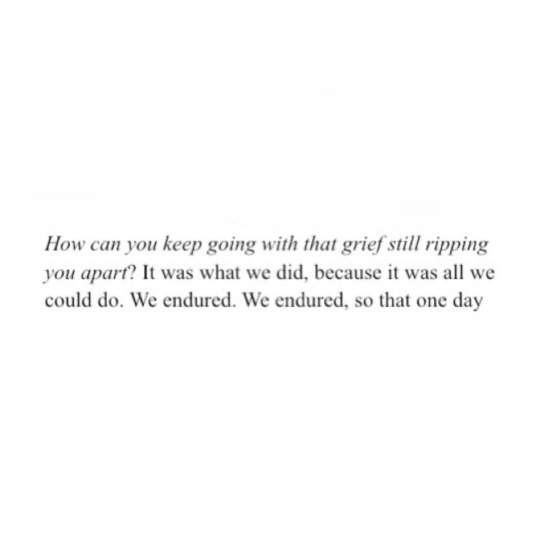

new to writeblr !!
hello! my name’s carrie, i’m a writer. i’m currently working on my second novel, which i’m hoping to get professionally published (and i’m really hoping people adore it the way i do)
more about me under the cut :)
- from the south of england
- from the south of england
- from the south of england
- lesbian and proudly aspiring sapphic rep writer :)
- infp
- studying english lit & creative writing at uni this september !!
🪴 welcome to my wips
- secret people is my first ever novel, written when i was 15 and finished last year when i was 17! i’m hoping to come back to it and rework it one day so it can be ready for publishing :) it’s a ya fantasy novel about this town that’s a safe haven for supernatural beings, who have to live in secret to protect themselves from Mundane’s fear / Hunters. it follows oliver, a green witch, rosie, a generational green witch and bronte, a necromancer who showed up in town out of nowhere unaware of how insanely powerful he actually is, aided by rowan and jaxon, two gods who have become the town’s unoffical (well, jaxon is the mayor. rowan just knows how to pull a good pint.) leaders.
- the lmc is my main wip that all my focus is on at the moment. it’s hugely reminiscent of donna tartt’s tsh and the goldfinch combined, as her writing style has influenced me a lot and really helped me as a writer. it follows rhy hart, alex conoro, dean dempsey, lucien emery and tessa gallagher, a group of self-destructive and beautiful english students trying to figure out who they are, all while grappling with the violent murder of the vice chancellor in an exact replica of the murder in oscar wilde’s the picture of dorian gray
- twelfth house this one is still in it’s early stages, as it’s something i picked up without any knowledge of the plot to curb some of the writer’s block i was experiencing with the lmc. it follows theo minerva in late 19th century/early 20th century perdam, who has been roped into a gang war between her bookkeeping employer and tobias finnigan, the den boss reigning over all of east perdam. at the same time, it follows prince elliot of strauss, who is grappling with mounting pressure to do what is right for his country and to find a wife to stabilise the strauss-oxslavian alliance.
🪴 my ambitions
- to be honest, i’ve turned to tumblr in a bit of a desperate grab at recognition, which i know sounds ridiculous. i really want to be able to build a bit of a community or at least draw some attention to my work before it’s out in the world, so that there’s at least a chance that it won’t crash and burn immediately. i’m also looking for a supportive place to find inspiration and motivation, so if you have any favourite writeblr accounts, please let me know!
- one of two of my primary goals with my writing is to write as much good sapphic (and wider lgbtq, but i think sapphic, particularly lesbian representation is severely lacking in media) representation as i can. i want it to be as normal as possible, without their oppression/sexuality being the centre of their character (saying this, the lmc has two characters dealing with severe religious trauma and/or internalised homophobia. but my point still stands.)
- my other primary goal is to write something that makes you feel seen, even if it’s by one little passage that sends you running to find a pen to underline it with because oh god someone else has put this very big very lonely feeling into words, like a little life, richard siken and the goldfinch did for me, because it truly did change the whole game and if i can do that even a tiny bit? i’ll die the happiest woman who ever lived.
- i’m also experimenting with poetry, one of which i’ve put above. that one is about being told that once i move out, my room, which has genuinely become a sanctuary, will be gutted to make space for something else. it hurt a lot.
so i guess that’s it! if you read all the way to here, thank you so much for caring about a stranger at least a tiny bit, just enough to keep your interest this long. i really hope you decide to stick around and keep me company on this little journey of mine <3
💌 much love, carrie x
(p.s. my askbox is always open !! feel free to send me anything — within reason, of course.)
#writeblr#writers of tumblr#my writing#wlw#new writeblr#intro#dark academia#poets on tumblr#literature#art#iloveyou-itllpass#carrie foley
20 notes
·
View notes
Text
How La Fayette broke his femur-bone
During the cold season we are all advised to be careful. Freezing temperatures, ice on lakes that will not support you sufficiently, slippery roads and pavements – that was no different in the 18th and early 19th century. To his great misery, La Fayette learned this lesson through first-hand experience. On February 23, 1803 he slipped on an icy street in Paris and broke his femur-bone close to the hip joint.
In his autobiography he retells the event:
„Soon after bidding farewell to his English friends, Lafayette was leaving the building of the Ministry of Marine, when his foot slipped on the ice, and he fell heavily on the pavement, breaking his hip - bone. He was assisted into a carriage, and taken to the house of M. and Mme. de Tessé, where his wife soon arrived.“
Two little notes. First, the Ministry of Marine was located near the modern Place de la Concorde. Second, he did not actually break the hip-bone itself … that would have been far, far worse.
A friend of La Fayette referenced his accident in a letter to Thomas Jefferson on Febuary 15, 1803:
“bien peu de jours apres la lettre que vous m’avez ecrit et a laquelle je me fesois un grand plaisir de repondre, jay eprouvé un cruel accident c’est une chutte qui ma cassé los du femeur de la Cuisse juste le même malheur que m de la fayette(…)“
[Just a few days after receiving your letter, which I looked forward to answering, I had a terrible accident, a fall that broke my hip bone, exactly the same misfortune as Monsieur de Lafayette.]
La Fayette himself wrote on March 31, 1803 in a letter to Thomas Jefferson:
“(...) and I my dear Sir I am dependent upon an accident which has rendered it impossible to write myself, and not very easy amidst my sufferings, and the attendance of surgeons to direct a correspondence. I have already been for five and fifty days under the pains of a broken Phémurés-neck and the operation of a new invented machine, I have still three weeks to remain uncomfortably on my back, but I now am sure to recover the use of my thigh without any lameness. as to the particulars of my misfortune and treatment, nobody can better give them than General Bernadotte who has been a most friendly visitor at my bedside. (…)“
He further wrote to Jefferson on May 17, 1803:
„I have met with a Sad accident, the breaking of my Thigh, at the Col du femur it has been more compleatly mended than perhaps any fracture of the Kind, but I have paid it dear—the application of a new machine has left me very deep Wounds, besides the great sufferings I have undergone—My Situation does not yet allow much writing—But I wanted to express to you my Joy on the grand affair and my Gratitude, both to Congress and to you, for the honourable bountiful mark of Kindness I have received—“
A day later on May 18, 1803, Richard Peters wrote to James Madison, also relating La Fayette’s accident:
“After describing the Situation of another worthy old Officer who has a Provision in their War Department he mentions Mr la fayette as one who alone is under a Necessity of looking to this Country for Assistance. “Our Friend la Fayette who in a Fall, had, some time ago the upper Part or Neck of the Femur fractured, begins to do well.”
Jefferson also received a letter from London from his friend James Monroe, dated September 20, 1803, who had just been in Paris and had met La Fayette there.
„I saw Genls. La Fayette & Kusciusko often. They are the men you always knew them to be. La Fayette has the same ardor that he had when he began the French revolution while you were in France. He had unfortunately dislocated his thigh in its junction with the hip, & experienced unexampled sufferings by the application of a new invented machine, wh. the surgeons thot. necessary to his cure. The prospect, tho’ doubtful when I came away, was in favor of his perfect recovery. I have not heard from him since.“
La Fayette was treated by two surgeons and the procedure of his treatment is what really makes the story worth telling. Again turning to the Marquis’ autobiography, we can read there that:
“The character of the fracture led the physicians to expect a shortening of the leg and a permanently crippled condition. To avoid this result, they offered Lafayette the only alternative of undergoing the confinement of his leg in a newly invented machine, which might preserve its length, but would necessitate forty days of ceaseless pain. Lafayette resolved on this course, and for six weeks suffered excessive torture. The uncomplaining patience with which he bore the pain deceived the physicians. The bandages were too tight, and when they were removed the leg presented a sight which terrified the physicians and gave them little hope of saving the patient without amputation of the limb. The tension of the bandages had been so great that the flesh was deeply cut and part of the calf had to be removed. The physicians were greatly mortified at their error, and this experience modified the future use of the new instrument. But Lafayette, notwithstanding the permanent injuries caused to him by the treatment, was well satisfied to have endured it, as his leg was not shortened, and a gradual improvement enabled him to take his usual daily exercise. This accident and the sufferings entailed by it aroused much public interest, and gave Lafayette an opportunity to estimate the value of his friends' attachment. Many generals, senators, and councillors visited him openly and in uniform. Among these, Moreau, Joseph Bonaparte, and Bernadotte were unremitting in their attentions. Some only ventured to inquire for news, others to ask their friends, and others again only to listen to such accounts as they heard given in public. Bonaparte's change of feeling was now shown. Having inquired the name of an officer at a parade, and being told that it was the young Lafayette, he exclaimed, “It is his son”, and passed on.”
La Fayettes personal physician, Jules Germain Cloquet also relates the incident in his book “Recollections of the Private Life of General Lafayette, etc.”
“Few possessed the virtues of patience and resignation in a higher degree than Lafayette. During his last illness, he acquainted us with the nature of the medical treatment which he had undergone in 1803 for a fracture of the thigh, occasioned by a fall on a slippery pavement. Deschamp and Boyer, whose memory I respect, and whom I am proud to have had for my masters, were summoned in their professional capacity to his assistance. The fractured limb was enclosed in a machine, which kept it in a constant state of tension; and as Lafayette had promised those skilful surgeons to support the pain with patience as long as they might judge it necessary for his cure, he uttered not a single complaint for the fifteen or twenty days during which the apparatus was applied. When it was removed, the surgeons were unable to conceal the annoyance they felt at the effect produced by the bandages. Deschamp turned pale; Boyer was stupified: the upper bandages had, by their pressure, cut deeply into the muscles of the inside of the thigh, and laid bare the femoral artery; the action of the lower ones had been less violent, but they had produced a mortification of the skin at the back part of the foot and laid bare the tendons of the toes. In consequence of Lafayette's stoical fortitude, the vigilance of his surgeons was completely at fault. Deep scars bore evidence of the truth of one of his observations to us, uttered, however, in confidence, through an apprehension of injuring, not the interests but the memory of two individuals for whom he felt gratitude, although their exertions on his behalf had been unsuccessful. A length of time elapsed before he recovered from the lamentable consequences which resulted from his medical treatment, and which were followed by an almost complete anchylosis and lameness of the hip - joint.”
Cloquet also re-printed a letter in his book that La Fayette wrote to a close friend.
“You are pleased to ask for a line of my hand writing, dear Masclet, and I employ the first moments I am able to scribble it. The fracture of my thigh is perfectly mended, better, indeed, than could be expected under such circumstances. But the extending machine has left deep and painful wounds, which cannot be healed within five weeks.”
La Fayette remained limp until the end of his life.
What does this story teach us? Always be careful when walking outside in the winter.
#marquis de lafayette#lafayette#la fayette#thomas jefferson#james monroe#james madison#paris#1803#ice#injury#hip#femur#fracture#french history#jules germain cloquet#letters#be careful
42 notes
·
View notes
Note
Also, extremely important: what do you think of an AU where people from the WOTR are caught in the plot of 'Dracula'?
EXCELLENT QUESTION. honestly i see the words “wars of the roses au” and i instantly smash that like button. it could go one of two ways:
the plot of dracula, but it takes place in the 15th century (which is plausible, seeing as the count is from an ambiguously medieval time period himself)
richard iii being like “hell yeah i can vibe with this dude”
henry vi feeling bad for dracula bc he doesnt want to hurt anyone, not even a vampire :’^(
dracula trying to make sense of the tangled mess of late medieval english dynastic politics (in the book he reads - among other things - train schedules, to improve his english and enhance his ability to blend in with victorian society; here he’d spend hours poring over genealogical tables, growing increasingly more frustrated because who the hell CARES who has the most royal blood flowing through their veins? its all blood anyway! precious, delicious blood...)
eleanor cobham and the woodvilles being accused not of witchcraft, but of colluding with vampires
cardinal beaufort becoming a vampire hunter by virtue of his religious vocation, stuffing the sleeves of his cassock full of consecrated hosts and extra large crucifixes
the princes in the tower disappear and of course its dracula’s doing. and then he adopts them because damn it, he may be an amoral vampire warlord but he cant stand to see these sweet, precocious children being used as pawns in a selfish political game
margaret of anjou and warwick each trying to cut a deal with dracula to get him to bite them and give them vampire superpowers, so he gladly bites them both
anne neville saying fuck this and going over to dracula’s side because are you tired of being nice? dont you just wanna go ape batshit??
or...
dracula with the standard 19th-century setting, but with a ragtag team of morally compromised megalomaniacs rather than a crew of light bound by the Power of Friendship
henry vi is an unassuming, soft-spoken solicitor and margaret of anjou is his badass educated New Woman wife. when henry goes to transylvania he immediately realizes his host is a vampire, but he just doesnt want to say anything because That Would Be Rude
margaret thinks vampires are cool (and respects dracula’s brides for exercising their Girl Power), but god damn it she’s the only one who gets to push henry around like that!
warwick is the shiftiest, least trustworthy van helsing ever. he isnt even all that invested in beating dracula and goes over to his side halfway through the story
the york brothers are the three suitors: edward is a dashing cowboy, george is a neurotic doctor addicted to drinking chloral, and richard seems like a quiet arthur holmwood type of guy, but deep down he’s kinda fucked up
anne neville is richard’s beloved fiancée who dies mysteriously and comes back as a horrific vampire, but richard’s like “jokes on you im into that shit”
in the 1931 dracula they partially merged renfield and jonathan together (mina has a husband in the movie, but his name is john and he has little to do with the jonathan in the book) so im gonna do the same thing here. henry has a nervous breakdown during his trip to transylvania and margaret finds him in a remote convent, in the grip of delirium and amnesia. sometimes hes completely unresponsive; at other times he raves about blood and eats bugs. after a stay at dr clarence’s asylum (which is admittedly not very humane by modern standards), henry slowly begins to recover enough to tell his story, though his mind is never truly the same again
thanks! <3
(feel free to add more ideas to this au - this is just what i could come up with but there are so many possibilities)
28 notes
·
View notes
Note
What is North and South?
I’M GLAD YOU ASKED, INTERNET NONNIE!!!
For the sake of your sanity and patience, I’ll give you the tl;dr version first: It’s a BBC mini-series (4 episodes) based off a book by Elizabeth Gaskell that everyone should absolutely watch (the version with Richard Armitage and Daniela Denby-Ashe is generally considered to be superior, although there’s an older version with Patrick Stewart that I need to check out at some point) but particularly fans of 1) Pride and Prejudice (because the love story is in many ways similar) and/or 2) fans of smoldering hotties because the miniseries is about 233 minutes long, and Armitage smolders through approximately 230 of those minutes.
Was that still a little long for a tl;dr? OH WELL! Wanna delve into the longer version of why this movie has captured my heart? I’ll be kind and put it under the cut.
What’s the Story?
Excerpted from the BBC website: “Set against the backdrop of Victorian England's industrial north, it follows the fortunes of Margaret Hale, one of 19th century literature's most original heroines. Margaret is a privileged, middle class southerner who is forced to settle in the northern town of Milton. Her distaste for the town and its people extends to handsome and charismatic cotton mill owner John Thornton, whom she believes epitomizes everything she dislikes about the North. As events conspire to throw Margaret and Thornton together, the two spirited characters have to overcome their repressed physical attraction for one another and conquer prejudices of class and circumstance.”
I read online that the BBC actually didn’t expect North and South to be very popular, so they didn’t promote it very much. ... And within two to three hours of it airing, so many fans flocked to the BBC message boards that they crashed the site. Needless to say...the BBC got that one wrong.
That’s Great, But I Meant the Love Story!
Okay, yeah, there’s an interesting perspective about the rise of unions, workers’ rights, and cotton production in the 1850′s, but let’s be honest. That’s not why we’re here. We’re here for the love story. We’re here for the ship. And the ship is SO WORTH IT!
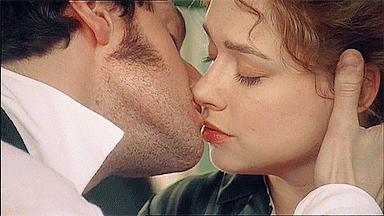
So I said that fans of Pride and Prejudice in particular should watch this because there are a lot of similarities between Elizabeth/Darcy and Margaret/Thornton.
* Initial misunderstanding upon meeting that gives our heroine a very bad impression of our hero? Check
* Pride and prejudice all up in this business? Check
* Hero hopelessly falls for the heroine while the heroine is convinced she cannot stand him? Check
* Even MORE misunderstandings? Cheeeeeeck
* SMOLDER? OH MY GOD CHECK
* Unfortunate Proposal (TM)? Check
* Heroine realizes she was wrong about the hero and falls for him when it May Be Too Late? Check check check
* Romantic moments that will steal your heart/make you swoon/make you think some Very Smutty Thoughts? Check check check check check check check
Honestly, it’s got it all. It’s P&P if Darcy grew up on the wrong side of the tracks and Elizabeth was socially above him. It also gives a lot more of Thornton’s POV than we got in P&P (which, don’t get me wrong, I adore), so if you love Misunderstood Men Soft for Just One Woman but really want to feel their heartbreak at Unrequited Love, let me tell you...whoo boy. There’s one scene in here where Thornton just stuck a dagger right in my heart and is totally the reason I couldn’t stop thinking about it for days and the obsession began. (For those familiar with the show, it’s when he tells his mother she’s the only one who cares for him. Oh my god, he broke my heart in that scene.)
Who’s the Heroine?
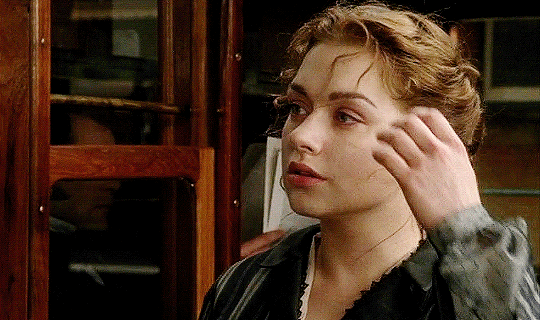
Our heroine is Margaret Hale. As it says in the synopsis above, she’s from the South. She moves with her family to the North when her father gives up his position in the church and moves them to the harsher, dirtier, coarser industrial town of Milton. She’s got a good heart and is plenty outspoken, but it takes her some time to adjust, and she does not get the best first impression of Thornton, I’m afraid. Over time, she comes to see him for the honest, honorable, compassionate, thoughtful, Hottie McHotterton that he is.
Okay, she MAY have already realized what a hottie he was because, honestly. LOOK AT HIM.
The Frock-Coated Fox
(My eternal gratitude for whatever N&S fan first coined that phrase because I will always think of him in those terms. Always.)

John Thornton is the owner of Marlborough Mills. He’s coarser than Darcy. Rougher around the edges. More hot-headed. But he abides by a strict code of honor, and his gruff exterior hides an aching vulnerability. He loves Margaret, even when he’s convinced she’ll never love a man like him in return. He’s proud - and hard in many ways - but he has more care and compassion for his workers than Margaret originally assumes (and more than he himself would perhaps admit).
I mentioned his general propensity to smolder, right? Oh, I didn’t?

Nobody

Smolders

Like

John

Thornton

He smolders even when she’s not THERE and he’s just THINKING about her!

But you want to know the only thing better than his smolder? When he’s soft. For her.


I...I may need a moment. My heart can’t take what I’ve just done to myself.
Are There Supporting Characters?
I mean...yeah. And they’re all amazing. Well, Fanny can be a bit of a trial. Even John agrees.
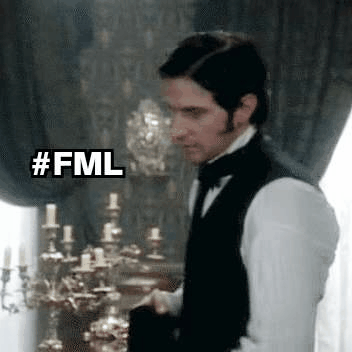
But I appreciate her anyway.
My favorites, though, would be:
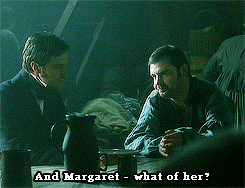
Nicholas Higgins. Margaret doesn’t hit it off with him initially, but they eventually become close after she befriends his daughter. A union man, he and Thornton do not initially get along. However, over time, they come to understand and respect each other and he may be the closest thing Thornton has to a friend - at least that we see.
And
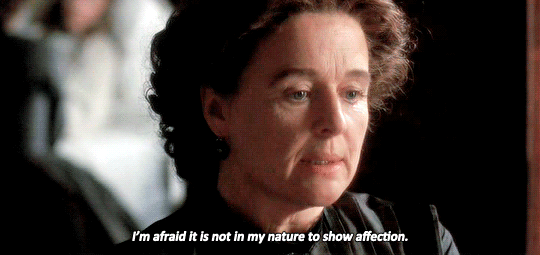
Mrs. Thornton, John’s mother. I think she can be a divisive character. I know several people who don’t like her. I, however, ADORE her. Every time I watch the show (and I did three times in one week), I come to love her more. She’s a hard woman - as much by circumstance as inclination - but she has a similar code of honor as her son, and she loves, protects, and believes in him FIERCELY. She is, for that reason...not...so much...a fan of Margaret, particularly after their first meeting, when Margaret scoffs at the notion of any woman being taken with John. Reeeeeeally not the best foot to start off on, girl!
So Is It Worth It?
Yes. It absolutely is, and if you give it a chance, I really hope you tell me what you thought of it!
To finish out my gushfest, I must point out that one of the most incredible things about North and South is how good they are at “show, don’t tell.” I didn’t realize the first few times that I watched that there is no “I love you” exchanged at the end. There doesn’t need to be.
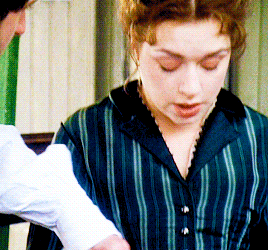
You know.
#north and south#I love these two#John Thornton#Margaret Hale#please watch and let me know what you thought!#Anonymous
61 notes
·
View notes
Text
Mortal Sanity

SSA Request ✧ Joker ✧ Mortality Link
@lady-of-fandoms: Aging indicator with the Joker? He found out who his soulmate was, and to gain immortality, had her captured and locked away. Batman and co. find out, and go to save her, but theres a complication, and the Joker sees the reader and starts aging. You can take it from there!
Notes: Some graphic gore. I’m so sorry, lady! I changed your request quite a bit. I tried using this request to write a different kind of Y/N.
Words: 2,514
When you live in a world full of superheroes, there are worst things than meta human villains, invading aliens, and psychotic clowns. One of them is having a soulmate.
Some say it’s better because your other half is easier to find, but they’re not the one who has a hero or a villain for a soulmate. You do.
You’re old. You’ve been alive since before Gotham. Your family was one of its first British settlers in the late 1600s. You are one of its original founders. You built this city and continue to care for it better than your own family.
Because they kept dying. One by one mortality catches up with them and each funeral strips away part of you, the side of you that grieves and fears death.
Whenever your spouses lay on their deathbed, you only feel disappointed that they weren’t the one. There was no way of knowing until you’ve spent time with them and seen the wrinkles on their skin next to your suppleness.
No one knew much about soulmates at all. Not until one of the three Fate Sisters visited Gotham in the late 19th century. You came across her by chance but to her, it was no accident.
“Your soulmate has not been born yet, child.”
You asked how much longer you had to wait but the Fates only give so little of their time. She didn’t answer and other people had crowded her. It took two world wars before another Fate passed through the city.
“Why are you so eager to meet them? There is still so much to do before your soulmate will be born.”
She was gesturing to the streets of Gotham, littered with people slumped over the gutters, children crying and holding their bellies, and mothers with babes sucking on their tits while they begged for money.
The war never passed through Gotham but its devastation has clawed deep into its foundations and stripped the people of their livelihood. Your eyes and your heart couldn’t take it.
You were the one who held the first meeting of the Court of Owls. You gathered every wealthy Gothamite, from old money to new business owners. The politicians were only later invited as a courtesy.
With the Court at your disposal, you built Gotham from the ground up, quickly turning it into the business capital of the country for anyone hoping to live the American dream.
But as the city’s population grew beyond your control, you had to cut your losses, divide the city into districts, and protect the wealthy. But unbeknownst to you, this was what set off Gotham’s descent into madness and the very creation of your soulmate.
The first sign of everything going wrong was the man dressed as a Bat. But his actions were in alignment with the Court’s will over Gotham and so you let him be. When villains in similar attire started to sprout all over the city, the Bat kept them in check. And so the Court did nothing.
And then the Clown entered the picture, causing devastations all over the city like you’ve never seen before. You watched buildings burn with children still screaming inside them, towers fell on people running amok in the streets, and the horrendous gas that left its stench at every street corner in Gotham.
The Clown is a plague and the Court has decided that he has to go.
After a meeting, you’re met with the final Fate sister. She has been waiting for you.
“Child, you’ve done well. You’ve loved and fostered this city like no other and I am truly misfortuned to be the one to tell you of your soulmate. Fate has been unkind to you.”
Your soulmate is the Joker.
Your knees suddenly go weak and your chest feels tight. Phantom claws are constricting around your heart. What you’ve waited for centuries is finally here and you don’t want it. Take it back.
The Fate sister holds your shoulders, “Stay strong, child. The worst is yet to come. I must tell you about your link.
“For years, you have not only eluded aging but also death. So long as you’re not in your soulmate’s arms, you will never die.”
Immortality is no stranger to you. Mortality even less. But the sudden prospect of knowing that the Clown himself is as immortal as you-- the image that Gotham would be plagued by his madness for eternity-- it terrifies you.
“I need your help.”
You’re standing in one of the meeting rooms of Wayne tower, interrupting a conference between Bruce Wayne and his major shareholders.
“Miss L/N,” Bruce treats you with respect despite your actions. He knows who you are. Knows what you are. “It’s lovely to see you but we are in the middle of something important here. You can make an appointment--”
“I need to talk to your friend,” you stare at Bruce and watch the subtle recognition dawn on his face. “It’s urgent, Bruce.”
You’ve always called him by his last name like you did his Thomas Wayne. It’s how you show your respect for his work and successfully making his father’s company his own. You only ever call him Bruce when you want to remind him that you’re older, much wiser, and more powerful.
Bruce clenches his teeth and shuffles the papers in his hand. He turns to his shareholders and gives them his signature playboy smile. “I apologize. We’re going to have to reschedule. It seems the Queen of Gotham needs me.”
Bruce loosens his tie as he walks around the table of perplexed and annoyed millionaires. He places his hand on your lower back, standing shoulder to shoulder, as he escorts you out of the room and into his office.
With the doors closed and his blazer off, Bruce’s demeanor changes. His eyebrows are no longer arched upwards but slanting down and his smile has been replaced by a deep scowl. His eyes pierce into yours when he turns to you.
“Start talking.”
You cross your arms and narrow your eyes at Bruce but quickly unfold them and relax. You didn’t come to fight. “I’m not here on behalf of the Court, Bruce. I’m here as myself.”
Bruce doesn’t say anything. He doesn’t exactly know who you are. He only knows exactly what you want him to know, and what little you allow is only necessary for him to realize that you have Gotham eating from the palm of your hands.
But you’re extending your palm now as you finally reveal to him everything that you are, who you have been, and what you’ve been waiting for. Even Bruce Wayne couldn’t hide the reaction on his face. He’s visibly horrified.
“You’re not immortal, Bruce. But if the Clown kills me, he will be.”
“What’s your plan?”
You grimace at the man behind the Bat. “Why do you think I need your help?”
Being the Queen of Gotham and the leader of the Court of Owls has distanced you from the city. You’ve been watching it from your highrise and no longer know where the streets bend and what the people look like.
You’re ashamed to be asking for help from someone so inferior. But Batman is the best weapon you’ve got against the Clown. He and his little band of eager boys.
“Does the Joker know about your link?”
You turn to Richard Grayson, a child always on the outskirts of the city with no Gotham blood flowing through his veins. “Yes. The Fates has an obligation to humor everyone with links.”
“I’m surprised the Joker didn’t kill her,” Jason Todd snorts. A real child bred and raised by Gotham herself. Through the good and the ugly.
“He tried. But the Fates aren’t human.”
“Really? What are they?” Timothy Drake. Another Gotham child. Middle class with the potential to join the Court. Potential lost to the Bat.
You raise an eyebrow. “None of you have links?”
“Only mindless individuals would believe in such nonsense.”
Damian Wayne.
You can feel each of your muscles tense as you turn to him. Definitely not a Gothamite. “Sounds like something an ignorant person would say.”
“This is enough,” Bruce interrupts.
You brought them to one of the secret bunkers of the Court. Years ago, you had constructed a facility for the truly dire patients of Arkham. Under Bruce’s instructions, you had reinforcements built into it to hold the Joker for eternity.
The boys purse their lips at Bruce’s word and follow him out of the cell. But you’re not one of his wards.
You touch Tim’s shoulder on the way out, “The Fates are ancient beings, as old as the soulmate links. They’re immortal but they’re not gods.”
Tim is still processing the information when Bruce interjects.
“Do you remember the plan?”
You roll your eyes, “Stay in my penthouse with the mini Bat watching over me until you find the Clown. It’s not exactly a science.”
Bruce holds out his hand to help you climb up the ladder out of the bunker but you reject him and climb on your own. When you arrive at your penthouse you won’t have to deal with him any longer. His son, on the other hand, is a different story.
“How does it feel to be told your soulmate is a psychotic maniac?” he asks as he looks down at Gotham through your large windows.
You suddenly feel the urge to hurl his tiny body down the side of the building. You probably don’t have the strength to do it but you won’t die trying.
“I thought only mindless individuals believed in soulmates.”
“I don’t believe in it. But I want to know the kind of mental state of someone who believes they're destined to live the rest of their life with the Joker.”
You roll your eyes at his arrogant smirk reflecting off of the window. You’re holding a glass of wine in your hand and you lift it up to cover Damian’s silhouette with the red liquid, wondering if the rest of Gotham’s children are as bratty. Absolutely no appreciation for things that are ancient and sacred.
It took another week before they caught the Joker. He proved to be a hard man to find when he’s not ready for showtime. The Bat had found him while setting up his next attack on the city. Bruce himself dragged him to the cell and made sure the reinforcements were still in place.
You’re surprised Bruce even trusted you at all. You think that maybe he knew exactly what you were planning in the first place. That he felt he had no choice and it was better to play the ignorant fool and let you and the Court do the dirty work.
The Clown is awake when you enter the cell with a gun in your hand. The moment his eyes land on you, you pull the trigger and shoot him in the head.
His body slams against the side of the table and his head tips back but slowly he reels it back up again. His eyes go twice as wide as the bullet hole on his forehead. His pale bony fingers tap on his head and one makes its way into the hole. The Clown laughs hysterically as he flicks the bullet out.
“The Fate sister was being literal,” you grumble, “We have to be in each other’s arms to age and die.”
The Clown suddenly stops laughing and stares at you curiously. You watch his eyebrows move up and down. “You mean that oooold hag was telling the truth?” He takes a step closer to you with excitement pouring out of every muscle in his body. “If I kill you, I’ll live forever?”
You glare straight into the madman’s eyes and he looks back. His pupils are dilated and roaming every muscle on your face. Looking for the lies. You’re ready to touch him, hold him and then pull the trigger again, when suddenly, he lowers his face and looks at you with bored eyes.
“No, thanks, lady.”
Your grip on the gun loosens but you quickly hold it still. The Clown turns around with his hands behind his back and starts looking at the interior of the cell like an invited guest.
“Now, why would I want something as booooring as immortality?” He looks back at you with an angry expression. His lips upturned in distaste. “Where’s the punchline? Nobody likes a joke that takes too long.”
“You… you want to die?”
The Clown turns his whole body back to you with his arms spread out wide. The hole in his head is completely gone. “Of course! My greatest gig depends on it!” He starts hunching over the table and his hands act like they’re directing miniature pieces on a stage. “Me and the Bat under the moonlight, all of his so called ‘partners’ dead around him. And then finally he’ll kill me--” he turns to you, glaring, suddenly realizing that your link is an inconvenience. Then he rolls his eyes. “I suppose a third wheel could add some impact to the scene.”
You stare at him dumbly. Unsure of what to think. You’ve lived all these years building up a city but to what end? To meet this psycho lunatic in front of you who is more infatuated with the Bat than anything else? This is your soulmate?
No one knows anything about the Clown. Except you know he’s 18. He has been for years and has probably gone crazy because of it. He doesn’t know about the links, never knew that he should’ve been waiting for you. That there’s a future already planned for him.
The Clown has taken steps toward you, eyeing the way you’ve held down your gun and are now staring mindlessly into his face.
“So. Soulmate.” He peers down at you, so close that you can feel his breath on your skin. “How about a teeny tiny winsy favor? You know, for love’s sake.”
✧ ✧ ✧
“You let him go.”
Bruce, dressed as the Bat blocks your path back to your town car after a meeting. You cross your arms over your chest. “The Court doesn’t want him prisoner.”
“The Court? Or you?”
You narrow your eyes at Bruce. You think he bugged the cell and heard every bit of your conversation with the Clown. You should have expected him to do so. But it’s not like it matters now. You turn away from him and check your cuticles.
“It’s your game, Bruce. Yours and the Clown’s. I’m merely a spectator.”
“I thought you cared about Gotham.”
A vein along your neck twitches as you clench your teeth. After everything you’ve done for the city. After all the hours you’ve dedicated to its development, and all the hope you’ve handed out freely to its people, what has it given you? Madmen.
“Gotham is my child,” you say sternly. “And just like any parent I need to let it learn to fend for itself.”
Bruce gives you a long look and narrows his eyes. “You’re sick. You deserve each other,” he says before walking back into the shadows.
No, Bruce, you’re the one who’s sick. Sick and dying every day. Always striving to make every minute count, when they’re all just meaningless in the grand scheme of things. Meaningless because everything is already written.
Unlike the Clown who’s writing his own destiny.
✧ Watchtower Masterlist ✧
#joker#dc#gotham villains#gotham#ssa#dc imagine#superhero soulmate au#dc imagines#joker imagine#dc fanfiction#dc reader insert#joker fanfiction#joker x reader#watchtower-feed
81 notes
·
View notes
Text
What Women’s Equality Day Means For Women in the United States
How many times have you heard that a woman’s place is in the home? How often have you been told to make yourself smaller and less visible, to make others (men) comfortable? It is disheartening and embarrassing that women still have to fight for equal rights and respect in the 21st century, but fight, we will. In honor of Woman’s Equality Day this week, I want to share what equality means to me as a woman and a pagan.
What is Women’s Equality Day?
Every year, on August 26, we celebrate women’s equality day. This holiday commemorates the woman’s suffrage movement and celebrates all that American women have accomplished since gaining their right to vote. This is the day the 19th Amendment was first signed into law in 1971 by President Richard Nixon, which is why it is also referred to as Nixon Day. Although we have come a long way since then, we still have a long way to go. A recent study showed that 40% of women don’t feel safe walking alone at night, and 56% feel unsafe when riding public transportation or walking alone at night near home.
A quick history of women’s rights in the United States
At one point in history, women were considered less than men. They couldn’t vote or hold office; they weren’t legally recognized as people at all, not even when it came to violent crimes against them. Fast forward to now: We’ve made a lot of progress—it’s hard to imagine a world where woman are constantly denied their human rights. But it happened (and still happens) every day.
March 31, 1776: In a letter to her husband, Founding Father John Adams, future first woman Abigail Adams made supplication to him and the Continental Congress to “remember the ladies and be more generous and favorable to them than your ancestors. Do not put such unlimited power into the hands of the husbands. Remember, all men would be tyrants if they could. If particular care and attention is not paid to the ladies, we are determined to foment a rebellion and will not hold ourselves bound by any laws in which we have no voice or representation.”
July 19-20, 1848: The Seneca Falls Convention was held in New York City with 300 attendees. The convention was the first women’s rights convention organized by Elizabeth Cady Stanton and Lucretia Mott. The Declaration of Sentiments was signed by 68 women and 32 men, including Frederick Douglass. The document sparked decades of activism, eventually leading to the passage of the 19th Amendment, which we celebrate today.
January 23, 1849: The first woman graduates from med school and becomes a doctor, Elizabeth Blackwell, MD. She graduated from Geneva College in New York with the highest grades in her entire class.
May 29, 1851: Sojourner Truth delivered the famous “Ain’t I a Woman” speech at the Women’s Rights Convention in Akron Ohio. As a former slave, turned activist Sojourner stated, “And ain’t I a woman? Look at me! Look at my arm! I have plowed and planted, and gathered into barns, and no man could head me! And ain’t I a woman? I could work as much and eat as much as a man—when I could get it—and bear the lash as well! And ain’t I a woman? I have borne 13 children, and seen most all sold off to slavery, and when I cried out with my mother’s grief, none but Jesus heard me! Ain’t I a woman?”
December 10, 1869: Wyoming passed the first woman’s suffrage law in America, thus granting women the right to vote and hold office. Late, in 1890 Wyoming was the 44th state admitted to the Union and became the first state to allow women to vote.
May 15, 1869: Susan B Anthony and Elizabeth Cady Stanton founded the National Woman Suffrage Association.
October 16, 1916: Margaret Sanger opened the first birth control clinic in the United States.
April 2, 1917: The first woman was elected to Congress as a member of the House of Representatives – Jeanette Rankin of Montana.
August 18, 1920: Ratification of the 19th Amendment to the U.S. Constitution is completed, declaring “the right of citizens of the United States to vote shall not be denied or abridged by the United States or by any State on account of sex.”
May 20-21, 1932: Amelia Earhart became the first woman pilot ever to fly solo nonstop across the Atlantic.
Read more about this history of women’s rights here
How can we honor the divine feminine by fighting for gender equality?
When stories about regular women are ignored, stories about goddesses are often buried, never to resurface again. Women’s empowerment can come in many forms, including the rediscovery of ancient cultural beliefs and stories that glorify the divine feminine.
In an age where feminism has become mainstream and gender equality has become more of a social norm, how can we honor goddesses like Isis, Hecate, Aphrodite, Artemis, Hera, Kali, and other Goddesses? Where do we find inspiration to fight for woman’s rights when so many women are fighting already? The answer is simple:
Learn from their fight.
Learn from these goddesses (both in the mortal realm and beyond) who fought tirelessly to achieve power and respect.
Read the stories of your ancestors.
Reflect on them.
Find strength and wisdom in these ancient tales.
Our fight is not over until every woman is free with equal opportunity to love, be loved, and have their voice heard. We are mighty beyond measure, and we will continue to fight as our ancestors have until our battle is won.
Carry on, sisters!
View this blogpost on our website: https://coven.cloud/2021/08/26/what-womens-equality-day-means-for-women-in-the-us/
1 note
·
View note
Text
Domestic (Head)canons
Note: ahhhh very first post headcanons/canon post of my ocs because I love them! Lowkey this helps me remember little things about them since my brain is rusty as hell (;´༎ຶٹ༎ຶ`) also there’s a lot of silly canons and some involve with reader <3
————————————————————————————————————————

————————————————————————————————————————
— Kunio Omezo —
☀︎︎ As an assassin, he’s been going through missions to missions nonstop; but the thing is with him, if you text him ‘there’s no food at home’; straight up Door Dash to your front door all bloody,,, while holding bag of fast foods in hand. A mission wouldn’t stop him from bringing you food.
☀︎︎ Kunio has the habit to switch from English to Japanese when he’s frustrated. But when he’s really pissed off he would really bring out his native language and sprinkle in English in the most aggressive way (But he mostly a cool head man so no need to worry about him).
☀︎ ︎But if he ends up being frustrations or depress, he would workout or bake right at home. He tried drawing and painting but that ended horribly for him since he can’t do artsy stuff (just for experience yknow?).
☀︎ He has this habit where he would fiddle his thumbs together when he’s excited. It’s honestly cute because a cold and deadly assassin with a stoic demeanor, fiddling his thumbs just out of excitement.
☀︎︎ Highkey enjoys his hair getting all ruffled up. Just the feeling of someone just semi aggressive rubbing his head makes him oddly relax in a way. But also slow head strokes would make him melt even more (bonus if he ‘purrs’).
☀︎︎ Kunio… Oh Kunio… he has a thing for fluffy things (but in secret). Wondering where he went? Just check the bedroom and congratulation! You found him in a cocoon of extra fluffy blankets. But once he walks up seeing you stand there in amaze and awe, he would be very embarrassed.
☀︎︎ “you better not tell anyone about this...”
☀︎︎ He got himself the best voice when it comes to singing, I mean he loves to sing though he’s a little embarrassed to do it in front of others. But he’s 100% down to sing you to sleep!
☀︎︎ His skin care routine is unbeatable, he spends more time in the bathroom way more than probably any guys. He likes to make himself look presentable and just having the slightest bump would irritate the crap out of him. So if you or anyone walk into the living room seeing Kunio on the couch just sitting there his hair slicked back with those headbands and clay mask on his face; he would look honestly unfazed for someone walking in.
☀︎︎ Kunio was thinking about owning a pet but… it was proven difficult because of his job as an assassin so he subsitute that idea with a house plant instead! He owns a aloe vera plant and monstera deliciosa (Swiss cheese plant). He named them Alen (Aloe) and Wendy (Swiss) for fun.
☀︎︎ He has a very strong sweet tooth, his favorite sweets are mochi! (A bonus if they’re animal shaped mochi because it’s a very special memory connected to his mom). He could go on for days eating sweets after sweets but he rather avoid diabetes.
☀︎︎ But hey, it you like sweets as well then say less, Kunio would drop some store bought sweets from your favorite local shop or even homemade sweets from him!
☀︎︎ Kunio wouldn’t consider himself the best cook but just hanging out and cook together would make him happy. But when it comes to baking, oh man you summoned the baking god. Seriouly though, he grew up baking sweets and treats with his mom so don’t be surprised to see some cute bakery sweets come out all great looking!
————————————————————————————————————————

————————————————————————————————————————
— Owen Fitzgerald —
☀︎︎ Owen a big ass cuddle bug, I mean he loves hugging people in general but just cuddling— it makes him so giddy inside (imagine a dog wagging its tail)
☀︎︎ He own one of those soft LED animal night light as a source of light for reading and having a friend as well! (His little friend is a LED Dino that can changes colors)
☀︎︎ When he was introduce to snacks like gold fish, pringles, pocky, gummy bears, etc. he became addicted; just discover a stash of snacks under his coat or even hoodies (if he switch to casual attire) and he’ll start sprinting to his room.
☀︎︎ “No! You are not taking my mini meals” *sprints off*
☀︎︎ Tech stuff obviously wasn’t a thing back in the 19th century, when he was introduced to futuristic, cutting edge technologies; it literally blew his brain into pieces (also fried some of his brain cells since explaining was covered under seconds). Couple months back when he discover Tik Tok, he can’t stop himself from being on that app and…. he accidentally got himself famous :)
☀︎︎ trashbin8 baby~ *wink wink*
☀︎︎ “🎤sawarasenai🥰kimi😸wa⛓shoujo👻na💅no✨böKù🌸Wâ🧚ÿARiçHiñ🤴BįCChī😾ńO😩oSû🚣Dà🎉YO💦”
☀︎ ︎Someone take Tik Tok away from him and don’t let him search up what the lyric mean ;nervous;
☀︎︎ No doubt Owen would be super invested in memes and will probably send either extremely wholesome or extremely curse memes at 3am because he loves you <3 (there’s no between).
☀︎︎ After spending weeks and weeks with his phone, he might have develop some a taste for lofi music. He couldn’t help himself but it really helped him read, write, or even just chilling.
☀︎︎ Talk about chilling, you would find him sitting outside on top of a roof and just soaking up the sunlight as the sun sets. Sometimes he’ll ask to join him and hey guess what, he bring snacks and drinks as well.
☀︎︎ Honestly loves tackling people for some reason (as a playful thing ofc) but he’s also ticklish as well ;eyes; if you get yourself in that situation, just tickle his waist and he’ll become a tea kettle. The more you tickle him the more he’ll laugh but also plea for mercy (and a bit of sobbing action).
☀︎︎ Tbh if you spare him... Owen would really say ’Peace was never an option’ and straight up tackle you again as a payback
☀︎︎ Owen reads old literature like A Study in Scarlet, Atlanta in Calydon, and The Ordeal of Richard Feverel. But he grew invested into reading manga, then later into watching Anime.
☀︎︎ ”This is way more entertaining than all the books i’ve been reading my entire life!?” *display the book as he flip through all the pages*
☀︎︎ what a chaotic man he is
————————————————————————————————————————
Note: I think I could do better but I’m too tired to think at the moment🏃🏻♀️💨
4 notes
·
View notes
Text
A Personal Note
I've noticed over the years that often bad news develops along a logical continuum.
I got some bad news the other day. It started months back, just a "hmmm, that's interesting" suggestion that something was wrong. Now I've progressed to "well that is concerning" and "what are we going to do about it?" The problem this time around is with my heart – the muscle, not the seat of my emotions – which is a thing many people face at this stage of life. I'm experiencing regular misfires and arrhythmias, but after about 3 billion heartbeats in my life so far, a few that are out of sync isn't too unusual. Ahead are more tests and information gathering, then choices about intervention and treatment. I know it's too early to be worried. Sometimes I am anyway.
To comfort and help myself I've been taking long walks in the sunshine and fresh air, and reading my favorite 19th Century poets, as one does in difficult times. I've been checking out those big colorful art books from the library. And I'm listening to lots of blues. The blues are always more soothing to me than upbeat songs. The Stoic philosophers would have loved the blues, with their reminder that things might be bad, but then, they could also be a whole lot worse. I've been reading Seneca's Moral Letters, and I love his suck-it-up-buttercup advice to Lucilius: "You will thus understand that some things are less to be dreaded, precisely because they inspire us with great fear. No evil is great which is the last evil of all. Death arrives; it would be a thing to dread, if it could remain with you. But death must either not come at all, or else must come and pass away.*" Anyway, I'm not at the death and dying stage of the bad news continuum – yet. No one needs reminding that the catastrophe eventually comes for us all, but it can't hurt to make peace with it sooner than later.
I know there are few things more boring than hearing people's complaints about their health. The surprising thing about being present on tumblr is that I know there are many people here who care for me, and will be full of tender concern. I am so grateful for you all! Something that would be a great help to me would be your suggestions of favorite blues songs that I could use to build a killer playlist. I'll compile your recommendations and share the collaboration in a few days. That way we can share the consolations too.
*Seneca's Ad Lucilium Epistulae Morales, Letter 4, translated by Richard M. Gummere
59 notes
·
View notes